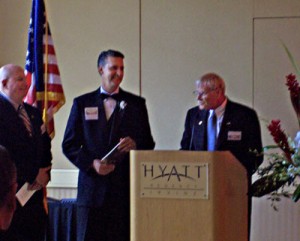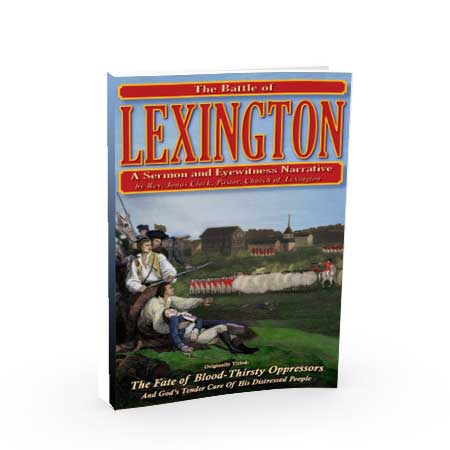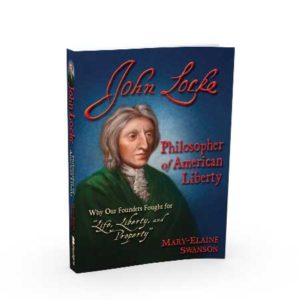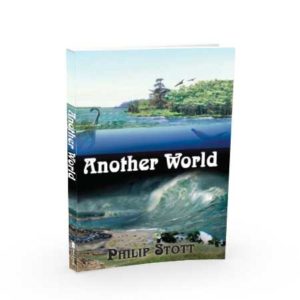Product Description
Lexington Sermon – Al Pulis, July 4, 2017
There was no better-prepared place to inaugurate the first battle of the War for Independence than the little village of Lexington. For Pastor Clark “discussed from the pulpit the great questions at issue, and that powerful voice thundered forth the principles of personal, civil, and religious liberty, and the right of resistance, in tones as earnest and effective as it had the doctrines of salvation by the cross” (J. T. Headley, Heroes of Liberty: Chaplains and Clergy of the American Revolution, 21). “It was to the congregation, educated by such a man, that Providence allowed to be entrusted the momentous events of April 19, events which were to decide the fate of a continent—that of civil liberty the world over” (Headley, 23).
Today, the Battle of Lexington is little spoken of, for as a nation we have forgotten our history. We have neglected the heroes of our freedom and liberty. But there was a time when this day was remembered and odes were written to commemorate the occasion. Paul Revere’s Ride and the Concord Hymn are two examples. (See Appendix, pages 75–88.) Our history books no longer tell the true story of Lexington, so we must.
 America is perishing for the need of preachers who apply God’s holy Word to every area of life including personal, civil, and religious liberty. The Church needs more pastors like Jonas Clark, a preacher who taught the great doctrines of salvation in Christ alone and the Biblical right to resistance, which gave his congregation courage to stand in the face of great odds. The Battle of Lexington should inspire every man, in all stations of life, to stand and make a difference.
America is perishing for the need of preachers who apply God’s holy Word to every area of life including personal, civil, and religious liberty. The Church needs more pastors like Jonas Clark, a preacher who taught the great doctrines of salvation in Christ alone and the Biblical right to resistance, which gave his congregation courage to stand in the face of great odds. The Battle of Lexington should inspire every man, in all stations of life, to stand and make a difference.
Rev. Christopher Hoops, Theology Editor for Nordskog Publishing
To hear more about the virtues of this Patriot Pastor, author of The Battle of Lexington, please view this sermon by the late Dr. D. James Kennedy, Pastor, Coral Ridge Ministries, entitled “Will the Church Forget?” (Jump to 5:00 for commentary on Jonas Clark.)
 On the 233rd anniversary of the infamous Battle of Lexington (April 19, 2008) in Irvine, CA, Brad Dacus, President of Pacific Justice Institute, at its annual Celebration of Justice banquet. There publisher Jerry Nordskog (PJI Advisory Board) presented a signed copy of the book with Patriot Pastor Jonas Clark’s sermon to modern-day Black Regiment (Patriot Pastor) Ron Gleason of Grace Presbyterian Church (Yorba Linda, CA), who is also President of California Exodus, for his patriotism and commitment to Christ.
On the 233rd anniversary of the infamous Battle of Lexington (April 19, 2008) in Irvine, CA, Brad Dacus, President of Pacific Justice Institute, at its annual Celebration of Justice banquet. There publisher Jerry Nordskog (PJI Advisory Board) presented a signed copy of the book with Patriot Pastor Jonas Clark’s sermon to modern-day Black Regiment (Patriot Pastor) Ron Gleason of Grace Presbyterian Church (Yorba Linda, CA), who is also President of California Exodus, for his patriotism and commitment to Christ.
Rev. Jonas Clark
Pastor of the Church of Lexington
Jonas Clark was born on Christmas day, marking his life in obedience to Jesus Christ. He had six sons and six daughters, all but four living at the time of his death. Four of the daughters married clergymen. Rev. Clark graduated from Cambridge in 1752 and was ordained in Lexington three years later. In addition to being a fulltime clergyman, he was an industrious, hard-working farmer. He cultivated sixty acres of land, which he still owned at the end of his life.
As the pastor of the church at Lexington, he typically gave four sermons a week, written out and orally presented—nearly 2200 sermons in his lifetime. His preaching was vigorous in style, animated in manner, instructive in matter, and delivered with uncommon energy and zeal, with an agreeable and powerful voice. His sermons were rarely less than an hour, often more, and in theological opinions he was considered amongst the Trinitarians and Calvinists. The spirit and temper of his life were just what the Gospel was designed to produce. He was a Christian in the highest and best sense of the term, shown to be such by a long and exemplary life and a faithful practice of the virtues he had preached to others. He was considered a patriot of the most ardent and decided character. In addition to all this, he witnessed the first outbreak of the War for Independence at Lexington.
Writing a little less than a century after the fact, Rev. William Ware of Cambridge, MA wrote:
It can be regarded only as a singularly happy circumstance that, as Lexington was to be the place where resistance to the power of England was first to occur, and the great act of a declaration of war first to be made by the act of the people in the blood to be there shed, making the place forever famous in history, the minister of Lexington should have been a man of the principles, character, courage, and energy of Mr. Clark.
He was eminently a man produced by the times,—more than equal to them; rather a guide and leader. All his previous life, his preaching, his intercourse and conversation among his people had been but a continued and most effectual preparation for the noble stand taken by his people on the morning of the 19th of April, 1775. The militia on the Common that morning were the same who filled the pews of the meeting house on the Sunday morning before, and the same who hung upon the rear of the retreating enemy in the forenoon and throughout the day. They were only carrying the preaching of many previous years into practice.
It would not be beyond the truth to assert that there was no person at that time and in that vicinity,—not only no clergyman but no other person of whatever calling or profession, who took a firmer stand for the liberties of the country, or was more ready to perform the duties and endure the sacrifices of a patriot, than the minister of Lexington.
When the struggle actually commenced, the people were ready for it, thoroughly acquainted with the reasons on which the duty of resistance was founded, and prepared to discharge the duty at very hazard. No population within the compass of the Colonies were better prepared for the events of the 19th of April, than the people of Lexington; no people to whom the events of that day could more safely have been entrusted; none more worthy of the duties that fell to their lot; or who better deserved the honours which have followed the faithful performance of them. No single individual probably did so much to educate the people up to that point of intelligence, firmness, and courage, as their honoured and beloved pastor.
It was a heavy day to the pastor, who, on the retreat of the British, visiting the grounds directly under the windows of his church, found eight of his beloved parishioners lying dead, and many others wounded. Of the transactions of that morning and day, Jonas Clark drew up a narrative, included as part of his anniversary sermon, which we have republished in this book.
—Gerald Christian Nordskog, Publisher
 America is perishing for the need of preachers who apply God’s holy Word to every area of life including personal, civil, and religious liberty. The Church needs more pastors like Jonas Clark, a preacher who taught the great doctrines of salvation in Christ alone and the Biblical right to resistance, which gave his congregation courage to stand in the face of great odds. The Battle of Lexington should inspire every man, in all stations of life, to stand and make a difference.
America is perishing for the need of preachers who apply God’s holy Word to every area of life including personal, civil, and religious liberty. The Church needs more pastors like Jonas Clark, a preacher who taught the great doctrines of salvation in Christ alone and the Biblical right to resistance, which gave his congregation courage to stand in the face of great odds. The Battle of Lexington should inspire every man, in all stations of life, to stand and make a difference. On the 233rd anniversary of the infamous Battle of Lexington (April 19, 2008) in Irvine, CA, Brad Dacus, President of Pacific Justice Institute, at its annual Celebration of Justice banquet. There publisher Jerry Nordskog (PJI Advisory Board) presented a signed copy of the book with Patriot Pastor Jonas Clark’s sermon to modern-day Black Regiment (Patriot Pastor) Ron Gleason of Grace Presbyterian Church (Yorba Linda, CA), who is also President of California Exodus, for his patriotism and commitment to Christ.
On the 233rd anniversary of the infamous Battle of Lexington (April 19, 2008) in Irvine, CA, Brad Dacus, President of Pacific Justice Institute, at its annual Celebration of Justice banquet. There publisher Jerry Nordskog (PJI Advisory Board) presented a signed copy of the book with Patriot Pastor Jonas Clark’s sermon to modern-day Black Regiment (Patriot Pastor) Ron Gleason of Grace Presbyterian Church (Yorba Linda, CA), who is also President of California Exodus, for his patriotism and commitment to Christ.






Cheryl C. Malandrinos –
As a history lover, I was drawn to The Battle of Lexington: A Sermon and Eyewitness Narrative by Jonas Clark. Originally titled, The Fate of Blood-Thirsty Oppressors and God’s Tender Care of His Distressed People, this book includes a sermon given by Clark on the one year anniversary of the Battle of Lexington, in which was fired “the shot heard round the world.” Also included is Clark’s eyewitness narrative of the battle where America’s War for Independence began.
A thought-provoking Introduction is provided by Reverend Christopher Hoops, and the eyewitness account is followed by five pages of Endnotes, and an Appendix featuring four poems: “Paul Revere’s Ride” by Henry Wadsworth Longfellow, “Lexington” by Oliver Wendell Holmes, “Lexington” by John Greenleaf Whittier, and “Concord Hymn” (“shot heard round the world”) by Ralph Waldo Emerson.
I memorized Paul Revere’s Ride in high school, and it’s one of my all-time favorite narrative poems. I’ve used it for a public speaking class and in a writing workshop with our third graders who were studying the American Revolution.
While I enjoyed this book for its celebration of an important part of America’s history, I was surprised to find in Clark’s sermon, lessons that could be applied to our modern world. His discussion on how God cares for His people and seeks justice for those who are oppressed would make for a good sermon today.
If you like historical accounts or want to teach your teen reader about the start of the American Revolution, The Battle of Lexington by Jonas Clark would be an excellent book to read.
Abbie Riddle –
I found this to be extremely interesting. Forced to memorize battle dates, outcomes, and commanders in high school I often sank into the muck of memorization for the purpose of passing a test. History so often was just that – an impersonal memorization of dates. I have long been fascinated by the personal side of history – taking to heart God’s command for Israel to pass down from generation to generation the works of the Lord (their history). I believe hidden behind the dates and outcomes lay important and overlooked details of God’s provision and love – and lessons that must be taught and learned.
The Battle of Lexington would have meant more to me had I read this book as a high school student. I would have done more than memorize the date and outcome. Like The Diary of Anne Frank is required reading when studying the horrors of the Holocaust and Hitler’s frightening rise to communistic power – so should this book be required reading when studying the American History.
Within this sermon and the eyewitness account are hidden deep spiritual truths that are foundational to every person’s life. A young reader is invited to experience firsthand the atrocities of war and the price of liberty. They are invited to see Jehovah-Nissi (The Lord is my banner) shine in battle as His provisional security and grace are accomplished in the midst of innocent bloodshed. One cannot but help feel a wave of patriotism well up inside as one reads this amazing sermon. It is as applicable today as it was in 1776 – Jonas Clark calls his people to repent and acknowledge God’s sovereign reign, to accept the Lord’s chastisement for wrongs, and to take hope in God’s promise of deliverance in the midst of terrible times.
I will say that I recommend this highly for high school and maybe junior high. The language and content may be more difficult for a young elementary age student to fully take in and appreciate. I look forward to having my children memorize parts of this sermon and the included poems as part of their history.
Edna –
Have you ever wondered who fired the shot heard round the world that fateful morning of April 19, 1775? Who were those brave men that stood against the best trained army in the world? The following is Jonas Clark’s Sermon and his eyewitness of those events. None other but Jonas Clark could give such an accounting, as he was the pastor of those embattled farmers who stood their ground. Clark is giving an honest accounting of the Battle of Lexington. This book is a good look at the way pastors used to preach and I remember them doing so.
America is perishing for the need of preachers who apply Gods Holy Word to every area of life. The Church needs more pastors like Jonas Clark, a preacher who taught the great doctrines of salvation in Christ. We need pastors today that are not afraid of stepping on someones toes or offending a life style that is taught to be so bad in the Bible. It seems today that everything goes and there is no morals anymore, not even in our churches. Old Satan is just sitting back and laughing at all the people he is getting.
Garrett Lear “The Patriot Pastor” –
I appreciate the scholarship of Nordskog Publishing by bringing the April 19, 1776 sermon of Patriot Pastor Jonas Clark in the beautifully produced The Battle of Lexington.
This sermon, although 232 years old, is very much needed for today as it describes how a people can become far from life in CHRIST and how they can be restored to THE FATHER’S will…it is about what we today call revival.
This sermon message describes the proper role of government in men’s lives and what happens when government becomes tyrannical.
The Battle of Lexington is about the cause of mankind…freedom, liberty and reliance on THE GOD of THE BIBLE…even its colorful cover elicits an American response which touches posterity.
This book and the associated appendix is a must have. As a direct descendant myself of The Founding Fathers and having been born in Lexington, I am giving this book to every preacher, legislator and patriot that I can afford to.
As a companion to Lexington, I also recommend GOD’S Ten Commandments. One cannot understand America’s foundations with out the truth expressed in this little book with a very big message. Both books are economically priced and sized just right to be handed out for pocket carrying.
Ben House –
In the early years of our Republic, the events surrounding the Battles of Lexington and Concord were staples of the patriotic diets of Americans. The great Schoolroom Poets of the middle of the 1800s all turned their poetic muses to celebrating this part of our heritage. Best known among the poems are Henry Wadsworth Longfellow’s “Paul Revere’s Ride” and Ralph Waldo Emerson’s “Concord Bridge” (which contains the unforgettable line about the farmers firing “the shot heard ’round the world.”
One of the best ways to get a first-hand look at the events of April 19, 1775 is to read The Battle of Lexington: A Sermon and Eyewitness Narrative by Pastor Jonas Clark of the Church of Lexington. This work was originally titled The Fate of Blood-Thirsty Oppressors and God’s Tender Care of His Distressed People after the sermon was preached on the first anniversary of the battle.
Nordskog Publishing has reprinted Pastor Clark’s sermon and personal experiences at the battle of Lexington. Nordskog is a Christian publishing company that has published a number of practical Christian books that apply Christian thinking to all areas of life. This particular publication includes some introductory materials and four of the poems (including the two I named above) that were written in celebration of the events.
Cara Putman –
The history minor in me loves period documents. This small book contains the sermon and eye-witness narrative of Pastor Jonas Clark, delivered on the one-year anniversary of the Battle of Lexington. For those who need a quick review: the Battles of Lexington and Concord were the first skirmishes between the British Red Coats and the Massachusetts militia because the British were out to take the store weapons of the militia.
The book opens with a short biography of Pastor Clark, an impressive man. Then the sermon follows. The language is true to the time, so not easy for young children to read. However, it will give a great flavor of the era to middle-school and high-school students.
The second half of the book contains Pastor Clark’s eyewitness account of the battle. The slim volume ends with an appendix of four poems that memorialize the battle: “Paul Revere’s Ride” by Henry Wadsworth Longfellow, “Lexington” by Oliver Wendall Holmes, “Lexington” by John Greenleaf Whittier, and “Concord Hymn” by Ralph Waldo Emerson.
This book is a nice supplement for middle- or high-school students who are studying the American Revolution. The volume will add a nice first-person account of this pivotal battle that in many ways launched the war.
Doc Kirby –
The original title of this book was The Fate of Blood-thirsty Oppressors, and GOD’s Tender Care of His Distressed People, 1776. The little book also contains four poems about the era : “Paul Revere’s Ride” by Henry Wadsworth Longfellow; “Lexington” by Oliver Wendell Holms; “Lexington” by John Greenleaf Whittier; and “Concord Hymn” by Ralph Waldo Emerson.
This remarkable document is told by a pastor who found eight of his parishioners dead and many more wounded in the aftermath of the Battle of Lexington, where was fired “the shot heard ’round the world.” Everything in the world changed on that day. Now we have an eyewitness to tell us about this earth-shattering event! Pastor Jonas Clark’s witness reminds us that we must stand and make a difference for the Lord.
Sarah Bailey –
…I enjoyed reading this book and will be keeping it on the bookshelf for required reading when my children and I study the American Revolution in our home school.